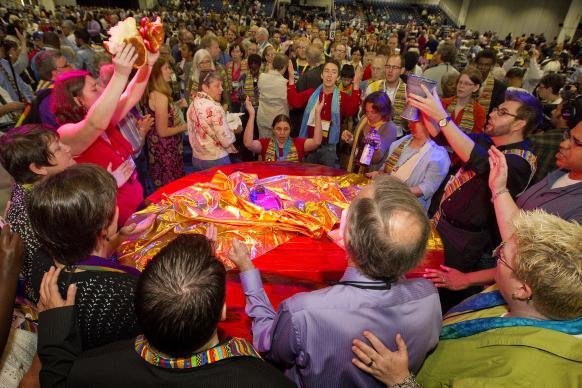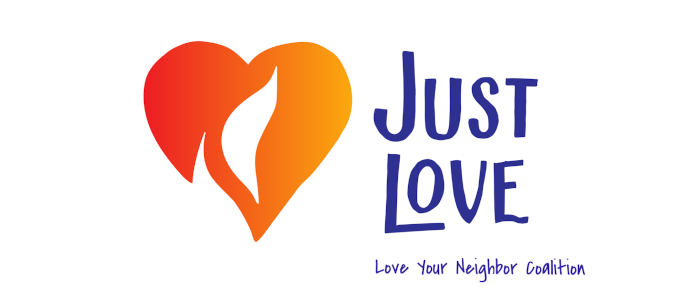Updates for Today - April 23rd
Read the latest JUSTice Highlights newsletter.
Today in plenary session: Support regular order - Don’t let the conference get stalled over accepting the Plan of Organization and Rules of Order.
Throughout the Conference: Listen closely to the African voices who ARE here, in respect for those who can’t be.
Learn about key issues by reading MFSA Plublines.
LYNC at General Conference - Things to know
The Love Your Neighbor Coalition joins the efforts of fifteen organizations working for justice and inclusion in The United Methodist Church and the world. Learn more on the ABOUT page.

Love Your Neighbor Coalition
The Love Your Neighbor Coalition is a partnership of 15 United Methodist Church-related Caucus groups working for a just, inclusive, and grace-filled denomination. For generations, we have named God’s grace for all of God’s children and cried out for justice. We call the denomination to end harm in every place where the Gospel of love is preached. We commit to love each other and stay in relationship with the global Body of Christ.
Events for Justice Seekers
Throughout the General Conference in Charlotte. LYNC Coaltiontion members will host various events to support the community and build relationships across the church.
Here’s a list of the scheduled events. But things keep changing! so check back for more updates.

Seeking racial justice in The United Methodist Church is imperative for the well-being of the church as a whole and of its members. The petitions in this plumbline were identified by the Inter-Ethnic Strategy Development Group (IESDG), which comprises leaders of the denomination's five official ethnic caucuses.
Recognizing changing social issues and concerns since 1972, The General Conference 2012 called the General Board of Church and Society to engage in a process to revise them “with the goal of making them more succinct, theologically founded, and globally relevant.” The General Conference’s direction was to review and revise the whole document to live fully into our identity as a global church.
Reproductive justice is a movement led by Black U.S. American women, with significant landmarks in 1989 and 1994. There are four shared tenets of reproductive justice today, as stated by SisterSong, a Women of Color Reproductive Justice Collective, and often shared by the group United Methodists for Reproductive Justice:
“The human right to maintain personal bodily autonomy”
“The human right not to have children”
“The human right to have children”
“The right to parent the children we have in safe and sustainable communities”
After more than 75 years of ethnic cleansing and settler colonialism in historic Palestine, after 57 years of a brutal occupation in the small amount of land left for Palestinians, after an inhuman blockade that has been slowly destroying the people of Gaza since 2007, having authoritative reports from the world’s leading human rights experts that Israel has created an apartheid regime in all the land it controls, and especially faced today with the terrifying events we have seen in the Holy Land since October, we need to act on our convictions and strengthen our commitment to peace in Palestine/Israel.
Around the world, we are seeing rising threats to basic freedoms, including freedom of speech, even in supposedly democratic societies. Christians have a responsibility to defend our freedom to speak the truth about injustice wherever we see it. We also must protect the right to act on our values and address systems of injustice with nonviolent methods such as boycotts and divestment. We know that speaking truth to power will incur repercussions, including misinformation, defamation, and intimidation. We must employ wisdom to discern when important concerns about racism are manipulated to silence opposition to injustice.
All too often churches have been complicit in the censoring and banning of books, often out of ignorance. Controlling what is taught, or not allowed to be taught, is dangerous and anti-democratic, and a growing threat. “The censorship of truth, books, and memory is a precursor to eliminating the voice and influence of a people from the governing of their own country.
In caring for creation, we are reminded that humans are a part of God’s holy creation. The impacts of climate change are immense, and the humans who experience the heaviest impact are the ones who have contributed the least.
In presenting legislation on creation justice and climate change, we seek to strengthen the church’s witness as a bearer of God’s goodness, minimize our shared harm, and make a difference in the places we can.
The Net-Zero Greenhouse Gas Emissions recommendation is a call from the United Methodist Climate Justice Movement for us to “DO SOMETHING” about the degradation of our environment caused by global warming and its resulting climate change.
The very first commandment in Scripture is for humans to care for the garden.
Establishing green teams empowers United Methodists to work together in their local context to address issues that are harming God’s Creation and perpetuating injustice. It also gives new and existing teams guidelines for effective action in four areas: Worship, Education, Practice, and Advocacy.
And then, God made humans caretakers of all God had created here on Earth, including animals, creatures of the sea, birds of the air, as well as humans. But, at present, humans are not working together in harmony with the rest of Creation as God intended. In fact, they are responsible for harming and even de-creating what God gave them to protect.
At this upcoming General Conference, delegates will likely be bombarded with a myriad of legislation and resolutions to be voted upon. However, tucked in all the pages and pages of legislation is one vital piece that supports the protection and support for deaf and hard of hearing persons and people with disabilities. The “Overcoming Ableism and Audism” legislation confronts the wider church regarding the bias and prejudices experienced by deaf and hard of hearing people and people with disabilities.











